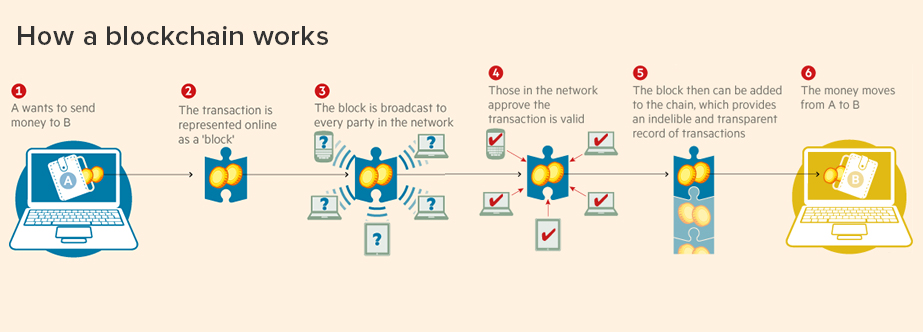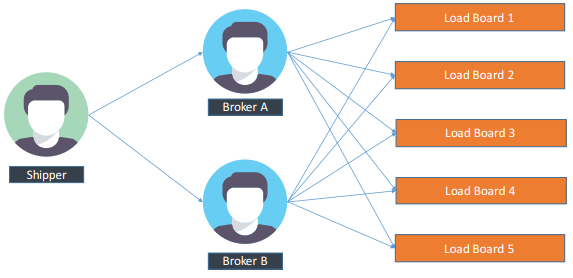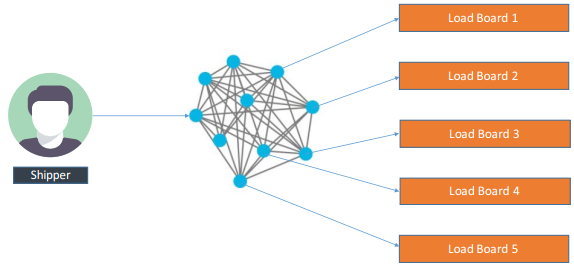Learn how blockchain technology is improving the world of transportation and logistics, making companies more efficient and profitable
The problems blockchain addresses
From dispute resolution to administrative efficiency and order tracking, blockchain has the answer to the the problems that have been plaguing the transportation industry for decades. Let’s explore some of these issues
Every day, there are $140 billion tied up in disputes for payments in the transportation industry.
For an average invoice, a company has to wait 42 days before receiving payment. Many businesses have millions of dollars tied up in their accounts.
Processing and administration costs have risen to as high as 20% of transportation’s overall costs, due to over-reliance on paper transactions.
8.5% of sensitive pharmaceutical shipments experience temperature deviations. Because of this, these products never make it past customs due to exceeding acceptable temperature ranges.
90% of trucking companies have six trucks or fewer. This causes the industry to struggle with matching shippers (the demand) with carriers (the supply).
Because of this, it’s estimated that truckers drive 29 billion miles per year with partial or empty truckloads.
How blockchain enables more efficient and cost-saving business operations for transportation and logistics companies
Let’s explore the ways blockchain technology is already improving our industry:
New Blockchain-enabled platforms will allow easy coordination of documents on a shared distributed ledger, making physical paperwork largely unnecessary.
By using smart contracts, approvals and customs clearance can be quicker and more efficient, reducing processing times for goods at customs checkpoints.
Swiss Tech Firm SkyCell created blockchain enabled refrigerated containers that brought their temperature-deviated rate down to less than 0.1%.
Organizations need updated, secure and authentic data to make decisions. Blockchain ensures trustworthy data across the transportation and logistics ecosystem, since the entire network contributes to data validation.
A recent study showed that a simple refrigerated shipment passed through 30+ different organizations, requiring 200+ separate communications. Any hiccup in these steps could cause the container to be held up or lost. With Blockchain, all of these steps can be recorded securely and immutably in real time.
With rising demand for same-day and one-hour delivery services, traditional tracking technologies will not scale. Blockchain technology provides a scalable, immediate solution for order tracking and authentication.
With Blockchain, the supply chain for truck parts and used trucks could be tracked on a digital ledger, serving as a sort of “CARFAX on steroids” for the commercial transportation industry.
Blockchain’s influence on the transportation industry is going to keep growing
Organizations like BiTA are working on creating universal standards for blockchain’s mass adoption in the transportation and logistics industry.
[BiTA members] account for about 85% of all truck-related transactions in the U.S. With nearly 1,400 pending applications as of February 2018, this number is sure to grow.
Blockchain And Transportation: A Match Made In Heaven
Companies in the commercial transportation industry sink or swim based on their ability to adapt to consumer needs, and implement new technologies that help them increase efficiency and lower the costs of shipping.
In the past year, blockchain technology has emerged in the world of trucking and logistics as a solution to to some of the major inefficiencies that have plagued the industry for decades.
But there’s one problem:
For most business owners, blockchain is no more than a buzzword, and its applications can be obscure and difficult to understand.
It’s all over the news and it seems to be taking over and revolutionizing every industry.
But what is blockchain technology? And more importantly, how can it be applied to the transportation industry in a way that benefits both business owners and consumers?
In this post, we’re going to explore how blockchain addresses some of the major issues in trucking and is set to revolutionize the industry.
Why Has Blockchain Crossed Into the World of Commercial Transportation and Trucking?
20 years ago, if you were to tell a trucking expert about the the amount of innovation that would hit the trucking, logistics and commercial transportation industry over the next two decades, they would be ecstatic.
If you were to tell that same expert the level of demand for same day shipping and the volume of online transactions leading to expedited delivery, they would be speechless.
The industry has come a long way.
Technological and procedural developments in logistics have bolstered the commercial transportation industry’s ability to efficiently service an all time high in demand—all while adjusting to an evolution in consumer preferences and expectations concerning delivery time and cost.
Even so, the trucking industry is far from perfect.
And that’s where blockchain technology comes in to save the day.
Let’s explore some of the key areas in which the industry struggles in terms of efficiency, cost and service to the end user.
Opportunities For Improvement In The Trucking Industry
Transportation Payment And Dispute Resolution
Every day, there are $140 billion tied up in disputes for payments in the transportation industry. To put things into perspective, that’s about equivalent to the GDP of Hungary.
For an average invoice, a company must wait 42 days before receiving payment. Many businesses have millions of dollars tied up in their accounts, which they could be using to advance their business, improve delivery times and better serve end users.
Administrative Costs
Processing and administration costs have risen to as high as 20 percent of transportation’s overall costs, due to over-reliance on paper transactions.
IBM and Maersk performed an experiment where the companies tracked a shipping container of flowers from Mombasa, Kenya, to Rotterdam, the major port in the Netherlands.
They found that just a simple refrigerated shipment went through more than 30 different organizations and required over 200 separate communications. Any lost form or delayed approval could hold up the container in port indefinitely, or get it lost altogether.
Transportation Of Temperature Controlled Goods
8.5% of sensitive pharmaceutical shipments experience temperature deviations. In the Middle East, that number rises to between 15-20%.
Because of this, many valuable biopharmaceutical products never make it past customs, as they exceed acceptable temperature ranges.
That means wasted transportation costs, additional administrative inefficiency, and in most cases, a loss of the product itself.
LTL Inefficiency
90 percent of trucking companies worldwide have six trucks or fewer. This causes the industry to struggle with matching shippers (the demand) with carriers (the supply).
Due to this issue, it’s estimated that truckers drive 29 billion miles per year with partial or empty truckloads. In case you were curious, that’s equivalent to just over a million trips around the full circumference of the earth.
This inefficiency in consolidating LTL loads costs trucking companies millions of dollars every year. It also raises shipping costs for consumers.
What Is Blockchain, Anyway?
Blockchain technology is based on a complex branch of mathematics called cryptography. Needless to say, the inner workings of the math behind blockchain are beyond what you intend to learn about in this post.
Instead of getting in the weeds of all that, here’s a 30 thousand foot view:
Blockchain is a technology that originated out of a branch of mathematics called cryptography.
In short, it’s a decentralized, shared digital ledger that that relies on the consensus of a global peer network to operate. The digital ledger is essentially a series of encrypted “blocks” that are linked together in a public “chain.”
Modifying the data in one block is impossible without modifying the entire chain and receiving consensus of the entire peer network.
This makes it incredibly difficult to perform malicious activity or falsify data. Once it’s in the blockchain, it’s pretty much in there for good.
An Example Of Blockchain In Action:
Since it’s impossible to really understand blockchain without seeing it in action. Let’s talk about a quick application you’ve probably heard of: Bitcoin.
Bitcoin—which has been the subject of seemingly infinite buzz over the few years—is a cryptocurrency. In other words, it is digital currency, exchanged and authenticated by a blockchain.
People use Bitcoin because of many of the inherent benefits of the blockchain
Here are a few:
- No need to rely on third parties for authentication. Instead, it’s a massive, global peer network (this also saves users from high merchant fees)
- It’s fast
- It’s more secure than regular transactions.
Here’s a great visual aid from Clavax, showing how blockchain authenticates and protects a transaction:

Bitcoin isn’t the only cryptocurrency out there. In fact, there are over 1,400 different cryptocurrencies and they hold a market capitalization of over half-a-trillion dollars worldwide.
Many of these “currencies” aren’t even about the transfer of money. They are about making business better, smarter, safer and more efficient.
Companies across the industry spectrum are coming to the realization that they can use blockchain technology to streamline their operations and provide better service to their clients.
The trucking and commercial transportation industry has been particularly active with blockchain implementation.
Let’s explore the vision behind blockchain’s role in trucking, and the companies and organizations leading the charge.
Champions Of Blockchain In Logistics And Trucking
As inefficiency mounts in the world of logistics and transportation, more companies are joining the charge to incorporate blockchain-based technologies into the trucking industry.
The Blockchain in Trucking Alliance (BiTA)
The Blockchain in Trucking Alliance, also known as BiTA, is the largest organization in the space. It boasts major members from just about every corner of the trucking supply chain, from UPS to Salesforce and DAT.
Membership in BiTA is steadily growing, with over 1,000 current applicants, but the overall influence of existing members is already massive. In fact, BiTA members account for over 85% of trucking-related transactions in the world.
BiTA was formed because leaders in the trucking industry saw the value of blockchain implementation into the world of trucking and logistics. BiTA’s ultimate objective is to form and promote the adoption of blockchain standards in the freight industry.
BiTA’s members have recognized that the key to a successful implementation of blockchain in the freight industry is the creation of universal standards.
According to Ken Craig, Vice President of Special Projects at McLeod Software (a BiTA member),
“blockchain provides another aspect of interoperability and visibility within the supply chain, much like electronic data interchange [EDI], application program interfaces or web services… However, blockchain without its own truly inoperable standards will develop into nothing more than a new process that mimics the difficulties surrounding the use of EDI.”
Clearly, BiTA members place a weight on the creation of universal standards, because they understand that blockchain in freight and logistics will only be successful if it eliminates the data and administrative inconsistencies that plague the industry in the first place.
BiTA published its first set of standards in 2018, but the vision is that they will continue to develop as members discuss issues such as transparency and chain of custody, freight payment, asset maintenance and ownership history and more.
8 Ways Blockchain Is Changing The Face Of Trucking, Logistics And Freight
1. Blockchain Means Better Freight Tracking
As demand for same day and on-demand delivery increases, and expectations of consumers become higher and higher, commercial transportation companies are faced with an ever-increasing need to innovate.
Many trucking companies already invest in great tracking technology, but scaling this technology to more difficult user demands is proving difficult—particularly when it comes to authentication .
According to a research paper by TMW, transportation companies need authenticated secure data to consistently improve their operations. The current systems for providing and recording this data—reliant on EDIs and APIs—are subject to misinterpretation or manipulation, which can have dire consequences on the global supply chain.
Blockchain’s Impact
With the help of blockchain technology, none of these issues would exist to nearly the same degree.
By using the blockchain for data authentication, the entire network can contribute and validate data, and it is no longer subject to tampering.
Increased reliability of tracking information can also have an impact in the conservation of goods being shipped.
For example, refrigerated and temperature controlled transportation relies on on-time delivery. This efficiency is only improved with the blockchain.
There has been considerable investment in blockchain technology in the world of temperature controlled goods and perishables. IBM has partnered with other global companies to launch an initiative “designed to bring the requisite efficiency, transparency and authenticity to food supply chains around the world.”
2. Using The Internet Of Things (IoT) And AI To Increase Efficiency
Blockchain, with the help of innovations in IoT, can be particularly useful for capacity monitoring.
Cargo Volume often defines the cost of shipping freight. By using IoT sensors in trucks and other shipping vehicles, shippers and transportation companies can detect the amount of space taken up in a shipment and determine cost accordingly, transmitting all of this information to the blockchain.
Remember our example from earlier, when we discussed the fact that 8.5% of sensitive pharmaceutical shipments experience temperature deviations and many of these shipments become too damaged to get to market?
With the use of blockchain enabled IoT sensors, Swiss firm SkyCell was able to create air freight containers for refrigerated biopharmaceuticals that monitor temperature, humidity and location. Because of this, in 2017, SkyCell was able to bring their temperature-deviation rate down to less than 0.1%.
Not only that, but SkyCell uses its cloud platform to record all documentation throughout the process on a blockchain ledger, such as bills of lading and customs forms.
Therefore, blockchain technology is acting to maintain the integrity of the valuable product being transported, but also to create an immutable, secure record of all documentation throughout the shipping process.
Keeping in mind the fact that global shipments often undergo numerous checkpoints and are handled by a variety of companies along the way, having this type of data on a secure, accurate record becomes a huge advantage for shippers.
3. Effective Tracking Of Fleet Or Vehicle Performance History
The importance of tracking isn’t limited to delivery performance. It’s also applicable to the performance of individual vehicles within a fleet.
When a large company or a small business wants to purchase a second hand delivery vehicle, the blockchain can help to authenticate information on the past performance of the vehicle and its maintenance history.
While companies like CarFax already exist for this purpose, they are intermediaries. The blockchain can store and validate all of this information for buyers and sellers without the need for a middleman.
Jack Legler, Technical Director of the American Trucking Associations’ Technology & Maintenance Council, believes that “distributed ledger technology will find its way into the mainstream of contract transactions in [the trucking] industry.”
He continues,
“As a consequence, warranty and truck parts supply chain transactions will adopt blockchain-based systems.”
If the records of all used parts and vehicles were to be placed on a secure, immutable ledger, there would be a much more standardized and reliable way to determine pricing and other factors inherent in purchasing.
4. Easier Carrier Onboarding
Just as blockchain can help validate the records of a second hand vehicle, it can also help to validate the driver records of a new carrier.
For example:
Let’s say a freight broker is trying to reach capacity for a load in a particular pickup location. The broker has identified a new carrier it can assign the load to, but can’t move forward with the assignment until the carrier has been properly onboarded.
This situation can be debilitating in a time crunch.
Blockchain technology can solve this problem by creating a decentralized network that holds all the necessary records of carriers across the transportation and freight industry. This information would be nearly impossible to falsify and almost immediate to verify.
5. Using The Internet Of Things For Vehicle To Vehicle Communication (IOT)
Here’s yet another way that blockchain technology and the Internet of Things can combine to improve efficiency in the trucking industry:
Some companies are already implementing Vehicle to Vehicle (V2V) Communications, which essentially allow for multiple freight vehicles to form a platoon and communicate, improving fuel efficiency and safety.
Storing and validating the data created by the use of V2V Communications on the blockchain can help transportation companies across the world streamline their operations.
6. Making Load Boards More Reliable
Many transportation companies are wary of load boards because data can often get muddled or duplicated, providing an unreliable representation of demand.
With the blockchain, shippers can post timestamped loads that are recorded and verified by the decentralized network. Because of this, a particular load cannot be duplicated and the data will maintain its integrity.
This also eliminates the need for a middleman in the form of a broker, because the blockchain can authenticate load data, prevent duplication, and make it visible to load boards.
Here are some helpful diagrams from TMW that explain the process with and without blockchain technology:
Without blockchain tech:

Notice how easy it can be for multiple brokers to post loads to multiple load boards, increasing the chance of duplication and skewed demand.
WIth Blockchain tech:

Using the blockchain, the load information is timestamped and stored on a decentralized network, accessible to different load boards.
7. Smart Contracts Cut Costs And Eliminate Middlemen
Smart Contracts may be the single most impactful blockchain enabled feature to the freight industry.
Smart Contracts are essentially self-executing tasks that are coded through the blockchain and executed when a certain condition is met.
To use a basic example, if a company wants to release payment to a shipper when an item reaches its destination, that company can program a smart contract to automatically pay the shipper when the item has reached a specific location.
According to Jeff Garzik, CEO of Bloq, supply chains nowadays are extremely inefficient because they rely on paper-based systems, “where forms have to pass through numerous channels of approval, which increases exposure to loss and fraud.”
By using blockchain, smart contracts could completely eliminate the need for all of these administrative steps, cutting costs and virtually removing all possibilities for error.
If we consider the fact that administrative costs make can make up 20% of the overall costs of transportation, the amount of money saved by using smart contracts effectively could be staggering.
8. Sweetbridge Uses Blockchain To Increase Liquidity In The Supply Chain
Sweetbridge is a blockchain based technology stack that addresses key inefficiencies in the global supply chain.
The objectives of Sweetbridge are particularly relevant in that they can have a major impact on solving many of the existing problems in the freight and trucking industry, such as supply chain liquidity, supply chain operations and supply chain flexibility.
Specifically, Sweetbridge has found a way to improve the efficiency of settlement between parties throughout the supply chain. As we discussed earlier, this is a massive issue in the transportation industry, as billions of dollars are tied up in payment disputes on a daily basis. In fact, companies wait an average of 42 days before receiving payment.
That’s 42 days of reduced liquidity and unnecessary administrative work.
By using Sweetbridge for settlement, companies “can reduce borrowing costs by 75% and increase liquidity by 25%.”
Sweetbridge also estimates that just by using its technology for settlement, “all parties in a supply chain can make 2% to 4% more profit.”
Blockchain And Transportation: What Are The Risks?
Just as the widespread application of any technology comes with its risks, the transportation and freight industry’s foray into blockchain technology presents some potential issues.
Some, like Daimler Trucks North America’s Director of Business Development, Lori Heino Royer, see the advantages of blockchain in trucking but identify some potential risks.
Heino Royer believes that blockchain’s immutability could backfire, as all data entry at its outset is subject to human error. She also mentions that if a company’s private key were to get damaged or misplaced, the blockchain would become unverifiable and there would be a massive loss of data.
Most other concerns stem from a belief that blockchain adoption in trucking and logistics will be just another imperfect technological adaptation.
Some entities in the industry are wary of mass adoption of new technology, as they have witnessed failures first hand.
Electronic Data Interchange (EDI) has been the standard system in the logistics industry for over 30 years, and the industry still lacks an overall EDI standard. Instead, there are multiple different versions of the technology, causing a messy chain of inconsistencies from company to company which contribute to many of the issues we’ve touched on in this piece.
The Keys Moving Forward
As organizations like BiTA continue to grow in membership and influence, it will become increasingly important for universal standards to be both created and adopted by member organizations.
If this process continues to develop as it has to this point, many of the concerns with blockchain’s application throughout the industry should naturally subside.
The future for blockchain in the world of transportation and logistics is bright.
In fact, according to Morgan Stanley:
“The revenue opportunity for blockchain within the freight and transportation space could end up being as much as $500 billion.”
To put things into perspective, that’s about double the current market cap of cryptocurrency as a whole, meaning we’ve barely seen the tip of the iceberg.
Morgan Stanley estimates that the $500 billion revenue opportunity will encompass elements of the industry like global truck brokerage, freight forwarding, truck fuel spend and supply chain management software.
Staying On Top of Industry-Wide Innovation
As our industry morphs and evolves to accommodate ever-evolving customer needs and expectations, it’s important to be in the know when it comes to innovations that can change the face of commercial transportation.
Blockchain is an absolute game changer.
If the BiTA continues its successful march toward the implementation of universal standards, blockchain’s role in transportation and logistics will continue to grow—and with it, the entire industry’s efficiency and profitability.
Want to share this infographic? Download it here.
Resources
- https://www.trucks.com/2017/09/21/blockchain-technology-transform-trucking/
- https://cointelegraph.com/news/shipping-giant-ups-joins-blockchain-in-trucking-alliance
- https://www.cnbc.com/2017/11/07/ups-dives-into-blockchain-technology.html
- https://www.i-scoop.eu/industry-4-0/supply-chain-management-scm-logistics/
- https://info.tmwsystems.com/blockchain-technology
- https://techcrunch.com/2018/03/02/blockchain-will-work-in-trucking-but-only-if-these-three-things-happen/
- https://www.fleetowner.com/electronic-security/blockchain-trucking-what-about-middlemen
- http://www.dcvelocity.com/articles/20160116-maersk-ibm-launch-first-blockchain-joint-venture-for-trade-transportation/
- https://www.freightwaves.com/news/blockchain/skycellblockchaincoldchain
- https://www.ttnews.com/articles/blockchain-trucking
